Soviets Pull Last Units Out of Afghan Capital : Shevardnadze to Meet With Rebel Leaders
- Share via
ISLAMABAD, Pakistan — Soviet Foreign Minister Eduard A. Shevardnadze was preparing today to meet with top leaders of the Afghan resistance after pledging to the Pakistani government that the Soviet Union is now seeking a political rather than military solution in war-torn Afghanistan.
A statement issued today by the Soviet Embassy in Islamabad quoted Shevardnadze as telling Pakistani President Ghulam Ishaq Khan, “The Afghan problem cannot be solved by military means.”
In an interview after meeting with the Soviet foreign minister, Pakistani Prime Minister Benazir Bhutto said she agreed that only a political settlement would avert more bloodshed in the nine-year Afghan civil war.
The expected meeting between Shevardnadze and the rebel commanders would be the highest-level talks ever between the Soviets and the U.S.-backed Islamic guerrilla movement that drove the Kremlin’s troops from Afghanistan. At least five of the seven leaders of the rebel alliance had gathered in the Pakistani capital by Sunday night, and several rebel sources said they hoped the meeting would take place sometime this morning. However, by mid-morning there was no word that such a meeting had taken place, and there was speculation that the arrangements for the talks may have broken down.
The session in this capital, which has served as the rebels’ main political headquarters during their insurgent campaign, would signal possible movement in the Soviet Union’s last-ditch effort to reach a political settlement in Afghanistan as it pulls out the last of its troops.
Shevardnadze put off his scheduled Sunday departure from Pakistan until today, principally so he could meet with the resistance leaders. Diplomatic observers speculated that the Soviet foreign minister would present new proposals to the rebels, who are trying to form an alternative government that would seize power after the Soviets leave.
Pakistani and Western analysts said that Shevardnadze’s concerted diplomatic effort was an indication of Moscow’s heightened concern about the stability of its strategic southern neighbor once the pullout is completed.
“As each Soviet troop leaves Afghanistan, their bargaining position goes down,” one Western diplomat said in Islamabad on Sunday. “It is now very difficult to see how the (Afghan) regime is going to hold out when they’re under siege in so many places. And I’m sure the Soviets know that.”
Officially, the Soviet leadership has insisted that the regime of Afghan President Najibullah, who was installed in Kabul at the height of the Soviet presence there, remains strong and stable. But Soviet officials privately have conceded that Najibullah and his Communist People’s Democratic Party will not survive without direct Soviet military support.
During negotiations with the rebels, known as the moujahedeen , in Taif, Saudi Arabia, last November, Deputy Soviet Foreign Minister Yuli M. Vorontsov proposed a coalition government that would include elements of Najibullah’s party--a plan the moujahedeen leaders flatly rejected.
The expected meeting with Shevardnadze would be the first direct diplomatic contact between the Soviets and the rebels since those talks broke down, and Pakistani officials said they were hopeful that the Soviet leadership is willing to accept a new Kabul government that excludes high-ranking members of the People’s Democratic Party.
“The basic question is, do the Soviets have any long-term interest in Afghanistan? If they do, they simply cannot leave Najibullah in power,” said one Western diplomat, when asked how the Soviets could abandon Najibullah after staunchly supporting him for so many years.
Public Relations Obsession
“How they finesse this, while not being perceived in Kabul as cutting their support for the regime, is their biggest public relations obsession at the moment,” the diplomat said.
A European diplomat, asked whether withdrawing support for Najibullah would hurt Soviet credibility with other Kremlin allies, said, “The message the Soviets will send to their allies is that if you do well, we will support you, but if you fail, then there’s only so much we can do.”
The diplomats and Pakistani analysts who, for the past nine years, have used Pakistan as a vantage point for gathering and assessing news of the Afghan conflict, added that Najibullah’s support even among his own top generals has deteriorated seriously.
More to Read
Sign up for Essential California
The most important California stories and recommendations in your inbox every morning.
You may occasionally receive promotional content from the Los Angeles Times.













